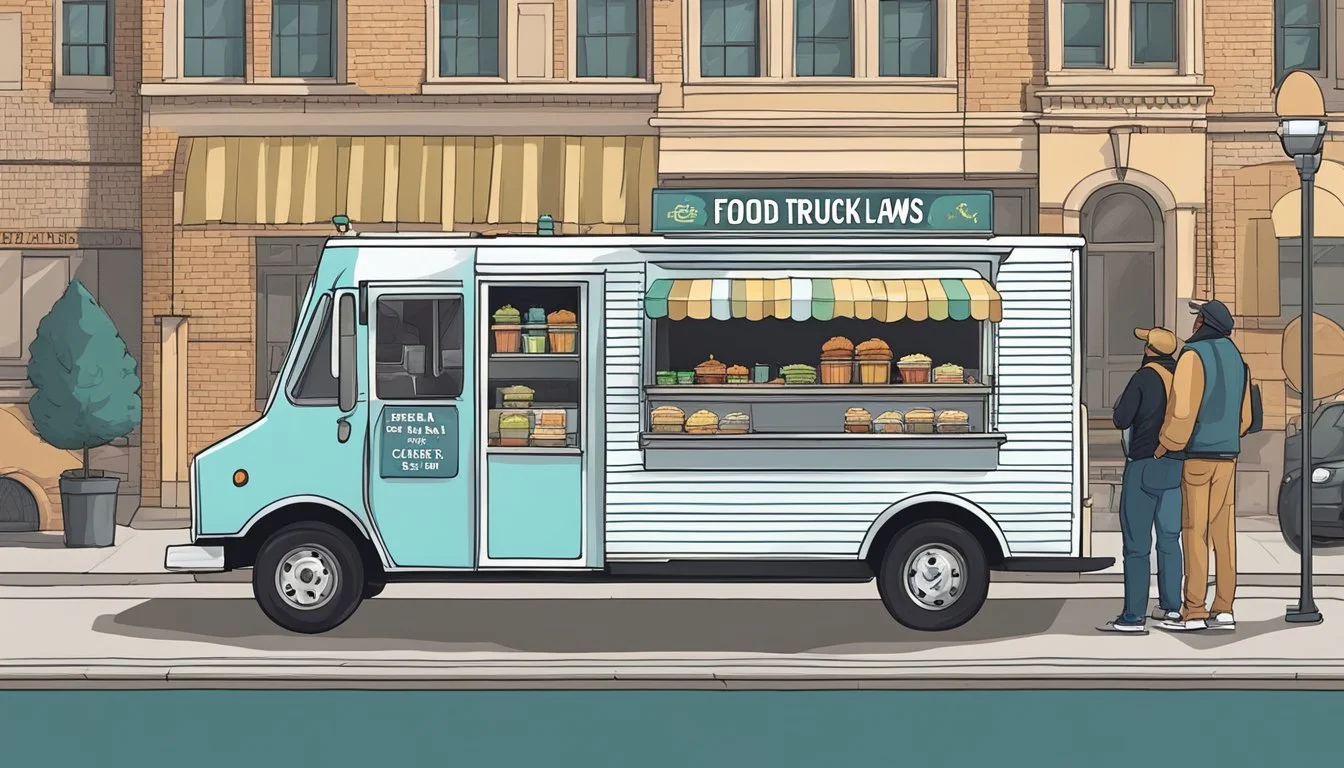Food Truck Laws Birmingham, Alabama
Navigating Regulations for Mobile Vendors
Food trucks have become an integral part of Birmingham's vibrant culinary scene, offering a diverse range of flavors and cuisines to residents and visitors alike. Navigating the regulations that govern these mobile food businesses is crucial for operators to ensure their ventures are not just creative but also compliant with local laws. The city of Birmingham, situated in the heart of Alabama, has established specific ordinances that provide a framework for the operation of food trucks within its jurisdiction.
The guidelines are laid out in the Food Truck Ordinance 13-174, which covers requirements ranging from permits and zoning to health and safety standards. This ordinance aims to balance the entrepreneurial spirit of food truck owners with the city's responsibility to maintain public health and safety. In addition to municipal regulations, food truck operators in Birmingham are also subject to health requirements set by the Alabama Department of Public Health, ensuring that food service is carried out in a way that protects consumers.
The implementation of these laws signifies the city's support for a dynamic food truck culture while prioritizing the well-being of the public. As such, prospective and current food truck operators must acquaint themselves with these regulations to conduct their businesses effectively and legally in Birmingham.
Understanding Birmingham's Food Truck Regulations
Regulatory compliance is essential for operating a food truck in Birmingham, Alabama. The city’s regulations are designed to ensure public health and safety while fostering a vibrant street food culture.
General Requirements
The cornerstone of Birmingham's street food regulation is the Food Truck Ordinance 13-174, which delineates the basic requirements for mobile food vendors. Any food truck operating within the city limits must obtain a business license and adhere to the guidelines set forth in this ordinance. It is essential to maintain these standards for both legal compliance and the safety of consumers.
Food Unit and Vehicle Standards
Food trucks in Birmingham must meet specific food establishment sanitation guidelines under Chapter 420-3-22. This includes having proper facilities for storing food at safe temperatures, access to handwashing sinks, and methods for the correct disposal of wastewater. Additionally, the commissary from which the food truck operates must satisfy health and sanitation standards, including providing toilet facilities.
Food Truck Operation Zones
The city of Birmingham regulates where food trucks may operate, with certain zones designated for mobile food vending. Operators must be aware of these designated areas and timing restrictions to avoid penalties. The discussion of operation zones within the ordinance specifies the public streets, sidewalks, and rights-of-way where food trucks can do business, reflecting the effort to balance urban development with the interest of local vendors.
The Permitting Process
In Birmingham, Alabama, food trucks must go through a regulated permitting process to ensure food safety and compliance with local laws. Starting a mobile food business involves several steps from application to obtaining necessary approvals.
Application Procedure
Food truck operators in Birmingham must initially file an application for a mobile food vendor permit. This application should detail the specifics of the food truck including its size, proposed menu, and operating locations. The Birmingham City Council stipulates the detailed requirements and operating conditions for mobile food vendors.
Required Permits and Licenses
Business License: All food trucks require a valid business license to operate within city limits.
Mobile Food Facility Permit: This permit is essential for food trucks to legally serve food on public property in Birmingham.
Sales Tax License: Operators must collect and remit sales tax, making this license a necessity.
The Alabama Department of Public Health also requires mobile food trucks to adhere to state regulations, which may entail additional permits.
Health Department Approval
Food trucks must pass a plan review conducted by the Health Department to ensure they meet the necessary food protection criteria. This includes proper food storage, waste disposal, and the availability of water sources for hand washing and cleaning. Food trucks must operate from a commissary meeting all public health requirements.
Special Event Permits
For particular events in Birmingham, food truck operators might need special event permits. This is especially true when participating in festivals or periodic markets, where food trucks congregate in larger numbers. Each event may have its own set of guidelines and permit requirements, in addition to the standards set by the City of Birmingham.
Each step in this process ensures that food trucks maintain high standards for safe food handling and comply with Birmingham's food truck laws designed to protect public health and ensure fair trade practices.
Fees and Costs Associated with Food Truck Operation
In Birmingham, Alabama, food truck operators must navigate a series of fees and costs integral to legal and successful operations. These include not only initial business licensing and permits but also ongoing expenses for the duration of the food truck's operation.
Business License Fee
A critical step for food truck operators in Birmingham is obtaining a business license. This license signifies legal compliance and the right to conduct business in the city. The fee associated with this license can vary, with detailed information on specific costs accessible via the city's official Food Truck Ordinance 13-174 documentation.
License Fee Structures
The license fee is not a flat rate but is structured based on various factors, including the scope of operations and the type of food service provided. Operators may refer to the mobile food vendors section within the Food Truck Ordinance for precise details on how these fees are determined and assessed.
Other Associated Costs
Aside from licensing, food truck operators must account for other associated costs. These can range from equipment purchases to inventory costs, and from site permits for food zones to health and safety compliance expenses. A comprehensive breakdown of potential expenses, such as food truck startup costs, can guide operators in financial planning and is found on Food Truck Empire.
Participation in Events and Festivals
Food truck operators in Birmingham, Alabama, need to navigate a set of specific guidelines when engaging in local events and festivals. These regulations ensure public safety and fair practice among vendors.
Festival Guidelines
Food trucks participating in festivals must adhere to the Food Truck Ordinance 13-174, which outlines the operational requirements within the city of Birmingham. It is essential for vendors to obtain the proper permits and familiarize themselves with the provisions that apply to festival setups, including spatial arrangements, utilities, and waste disposal. They should also be aware of the permissible operating hours and designated areas for food truck operation during these festivals.
Event-Specific Regulations
When a food truck is involved in a special event, there might be additional regulations that come into play. These can include required clearances from city officials, adherence to event-specific health and safety rules, and compliance with any temporary vendor schedules, as stated in the amendment to the Birmingham Business License Code Ordinance No. 14-126 amended 14-126. Each event may have its own set of expectations and guidelines, and it is crucial for food truck operators to obtain this information well in advance to ensure full compliance.
Additional Considerations for Food Truck Owners
As food truck owners navigate the bustling streets of Birmingham, Alabama, attention to detail in menu creation, customer engagement strategies, and adherence to local alcohol regulations is paramount for operational success.
Food Menu and Offering
Owners must carefully curate their menu to meet the diverse tastes of their customers, while also being mindful of the food safety guidelines set by the Alabama Department of Public Health. It is crucial to offer a selection that appeals to the local palate but still stands out from competitors. They should prioritize maintaining food at required temperatures and ensure that all items on the menu adhere to health code standards.
Marketing and Customer Engagement
In today's digital world, effective marketing strategies are key to customer engagement. Owners are encouraged to leverage social media platforms like Facebook to create buzz around their offerings and attract a steady flow of patrons. A food truck’s success often hinges on its ability to craft a brand that resonates with food enthusiasts and utilize social media tools to connect with the community and receive real-time customer feedback.
Compliance with Local Alcohol Regulations
For those considering the inclusion of beer, wine, or liquor in their mobile offerings, strict compliance with Birmingham's local alcohol regulations is non-negotiable. Potential food truck proprietors must navigate the complexities of acquiring necessary permits and understanding the food truck ordinance specific to Birmingham. Serving alcohol comes with additional responsibilities and legal requisites, which require diligent observance to avoid penalties.
By being meticulous with menu selection, innovative in marketing, and rigorous in regulatory compliance, food truck owners in Birmingham can set themselves up for a thriving enterprise.
Community and Economic Impact of Food Trucks
Food trucks in Birmingham, Alabama have distinct effects on the local economy, particularly concerning restaurants and community events.
Impact on Local Restaurants
Food trucks have introduced a dynamic element into Birmingham’s dining scene, offering diverse cuisines and convenient street-side service. Notably, the Food Truck Ordinance 13-174 puts forth specific regulations aiming to balance interests between mobile eateries and established restaurants. For example, food trucks must maintain a distance of at least 150 feet from traditional brick-and-mortar restaurants to foster coexistence and minimize direct competition for immediate customer base.
Distance Regulations:
Minimum: 150 feet from brick-and-mortar restaurants.
Contribution to Community Events
Food trucks are becoming a staple at various community events, providing accessible food options and enhancing the overall event experience. They contribute to the community’s vibrancy and facilitate social gatherings. By being present at events like street fairs, markets, and festivals, food trucks add value by not only feeding the attendees but also by creating an ambiance that is conducive for community engagement.
Events Commonly Catered by Food Trucks:
Street fairs.
Local markets.
Cultural festivals.
Resources for Starting a Food Truck Business
When embarking on the journey of starting a food truck business in Birmingham, Alabama, entrepreneurs benefit greatly from thorough business planning and development, as well as building a strong network with other vendors. The right resources can lay a strong foundation for success.
Business Planning and Development
A detailed business plan is crucial. It should include considerations like acquiring an Employer Identification Number (EIN), which is necessary for tax purposes. Key components of the plan must also address securing a location, such as a mall or busy street, where the food truck can maximize customer foot traffic.
Entrepreneurs should be aware that Birmingham has a specific Food Truck Ordinance 13-174 that outlines the regulations for mobile food vehicles. Complying with this ordinance is vital for avoiding legal issues and ensuring a smooth operation. A comprehensive business plan also includes financial projections, marketing strategies, and an operational plan that details daily workflow and food preparation logistics.
Networking with Other Food Vendors
Building relationships with other food vendors can provide invaluable insights into the local market. Joining food vendor associations or attending food truck rallies can facilitate such networking. These connections may lead to collaborative events or shared commissary spaces, which are essential for food preparation and storage.
Gleaning knowledge from experienced vendors helps avoid common pitfalls, and peer support can be especially beneficial when navigating the regulatory landscape unique to Birmingham. For instance, partners in the industry can offer advice on the best locations and strategies for obtaining the necessary permits, including a Mobile Food Facility Permit or information on required health inspections, making compliance a less daunting task.
Legal Framework and Future Legislation
The City of Birmingham has established specific ordinances governing the operation of food trucks. Operators must navigate current legislations with a keen awareness of any upcoming legislative adjustments.
Existing Food Truck Legislation
Birmingham's current food truck ordinance, Ordinance 13-174, outlines regulations for mobile food vehicles. Key requirements include:
Operating with a general permit costing $300 annually or $500 for operations in the city center.
Mobile food services must operate from a commissary with facilities such as food storage at required temperatures and waste management services.
Operators are also required to adhere to health and safety regulations as stipulated by the Alabama Department of Public Health, which include maintaining a commissary for food storage and proper waste disposal systems.
Potential Changes in Law
The food truck industry's landscape is dynamic, and potential changes to the legal framework are a constant consideration for operators. While specific amendments have not been announced, food truck owners and operators remain vigilant for any new legislation from the City Council that could impact their business. They are advised to maintain compliance with the Alabama Department of Public Health requirements and stay informed about city council meetings and press releases for any changes in regulations that may arise.







